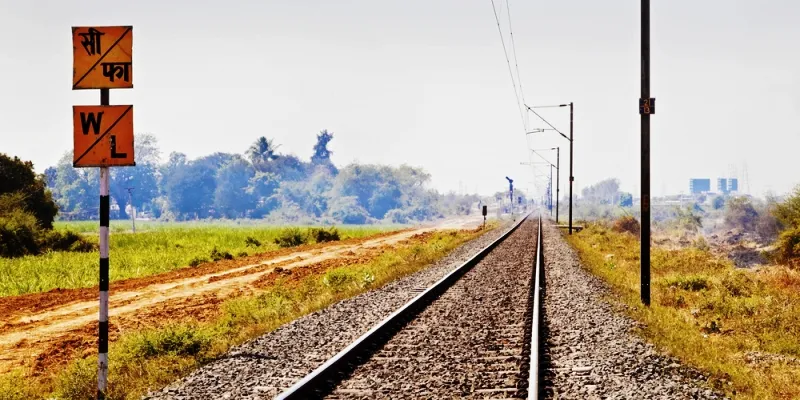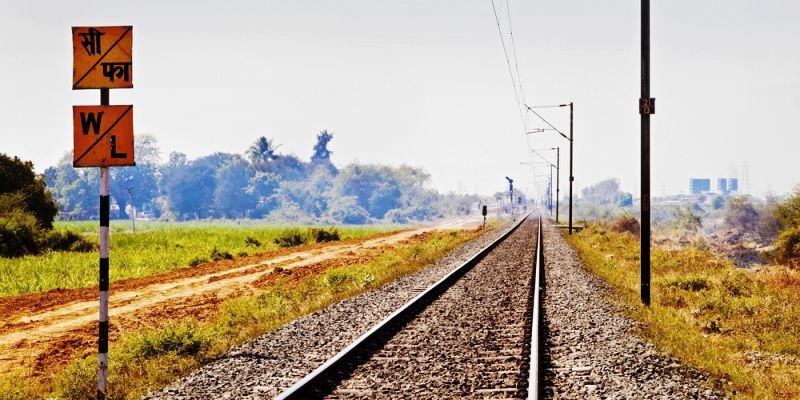IISc-incubated startup LabToMarket promises cost-effective safety for railways with AI tech
The railways plans to spend upwards of Rs 9 lakh crore to digitise operations, but IISc-incubated startup LabToMarket showcases Indian tech that can do it at a tenth of the cost.
At a glance
Startup: LabToMarket
Founders: Sudhir Kumar Sinha and Sreenivasa Rao Ganapa
Founded: 2016
Funding: Self-funded - Rs 1 crore
Revenues: Pre-revenue, expected to kick in FY2019
For anyone who has travelled by train in India, it is an experience unlike anything else.
The romance of the clacking of wheels along the steel track and the whizzing countryside aside, the Indian Railways transports billions of passengers every year, and on any given day, there are more than 12,000 trains plying on the tracks.
While most things about train journeys spell rustic, pretty much the same can be said for the technology that India’s largest employer uses. The railway’s 70,000-km network, covering thousands of stations, is still mostly operated by the station master, who controls the movement of trains into stations.
There is also very little technology involved in the maintenance of tracks. Even today, the railways uses the services of ‘gang men’ - track workers who are trained by ear to figure out fractures in rails by knocking on them. While these men are experts at their jobs, this is clearly not the most effective way to check tracks as there is always room for human error.
Sudhir Kumar Sinha and Sreenivasa Rao Ganapa’s startup LabtoMarket aims to change this reliance on humans, with technology to take over manual tasks and reduce the scope for errors.
The two have spent the last three years building algorithms with IoT to predict the rate of failure of railway tracks so as to allow for prompt corrective action. The IISc-incubated startup has also created an entire digital transformation stack for the railways, where platforms where a train arrives and other lines can be managed through tablets, and station masters can automate entry and exit of trains. This information can be used for future analytics to improve how railways functions. “These are complex algorithms that we are building and have implemented in a couple of places. We will go live by the end of the year,” says Sudhir.

In the beginning
A decade ago, Sreenivasa was running two startups for railway recruitment which he managed to scale up, and was with the Indian Railway Services prior to becoming an entrepreneur. He worked in various capacities for the railways, and was Joint Director and head of the Southern Region /Signalling and Communications Division of RDSO, Indian Railways. He realised that the railways was a plethora of business opportunities.
“While I built and sold a railway recruitment company, I also realised that the railways has been using technology that is largely global. That’s when I decided it was time to act,” says Sreenivasa.
After selling his startup, Sreenivasa met old friend Sudhir, who was thinking of starting up a company that would take ideas conceived in the lab to the market.
Sudhir was a faculty at the of Indian Institute of Science (IISc) for over 30 years, and retired from the Centre for Electronics Design and Technology in 2011. His main areas of interest were power electronics, fault-tolerant and safety-critical systems and embedded systems. So, when Sreenivasa expressed interest in starting up in 2016, they both decided to focus on the railways by combining their business and technology acumen.

The business
Last year, the Indian Railways announced it would spend Rs 10,000 crore on technology upgrades. However, at present, most digital technology contracts only go to large global firms like Alstom and Thales.
Sudhir and Sreenivasa began work on IoT technology and a digital transformation stack for the railways. They invested Rs 1 crore of their own money, and have two pilots at present. One of their products measures rail fractures, while the other helps a station master and his team manage the control room for incoming and outgoing trains in a station with tablets. The current method allows information flow, but it is semi-digital. One can see the control room in this video and the amount of paper used. “We want to ensure the entire system goes digital,” says Sudhir.
The railways recently announced it will spend on homegrown ERP technology to track railway purchases, and have a single platform for all divisions.
To get revenue, Sudhir and Sreenivasa, however, chose to first approach private cargo rail network operators before the Indian Railways. The private rail network in India is 8,500 km long, and is operated by big names such as the Adani Group and Reliance Industries, who pay rent to the railways for using the network.
“We have taken the products to the private sector because for them time is money,” says Sudhir. Companies face transportation delays every month due to fractured rail lines or stoppage delays, and companies can lose up to Rs 50 crore annually. LabToMarket seeks to save this money with analytics and IoT. It charges for outcomes, and also an annual maintenance fee. A private cargo fleet spends around Rs 20 crore to maintain five rail lines, whileLabToMarket can help in its maintenance for Rs 3 crore.
“IISc is taking ideas that were projects and experiments commercial. But the LTM team is filled with experience, and they have the background to go pan-India and even global,” says C. S. Murali, Chairman of IISc-SID.
LabToMarket is still in the pre-revenue stage.
When it comes to starting up, Sudhir and Sreenivasa show that age is only a number – and if these men have their way, there will be no more ‘gang men’ making predictions on track safety.







![[Weekly funding roundup April 20-26] VC investment dips as startups resort to debt capital](https://images.yourstory.com/cs/2/220356402d6d11e9aa979329348d4c3e/funding-lead-image-1669386008401.jpg)

![[Funding alert] Fintech startup Junio raises $6M in Pre-Series A round led by NB Ventures](https://images.yourstory.com/cs/2/ba9e8080834311ec9e7e95cb06cf6856/Juniofinal-1646375237755.png)

